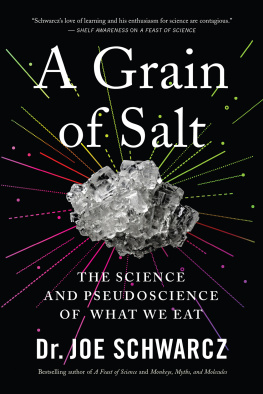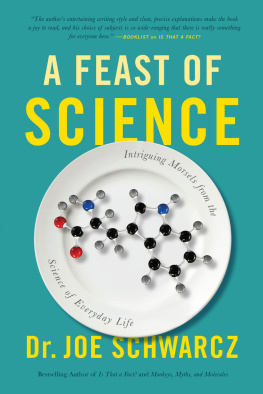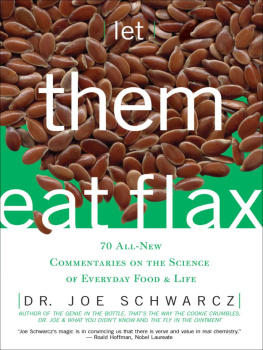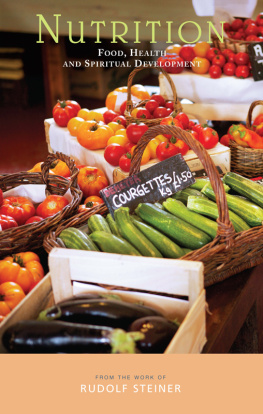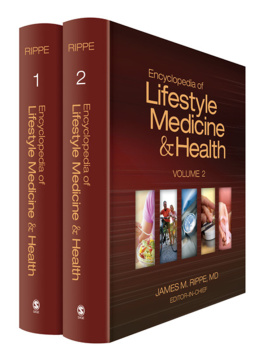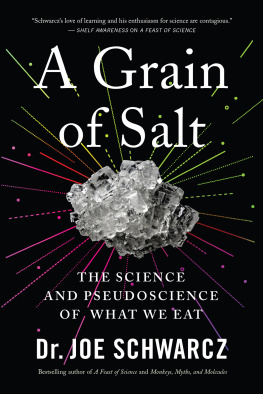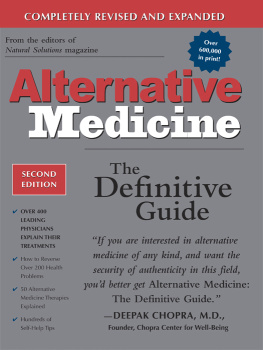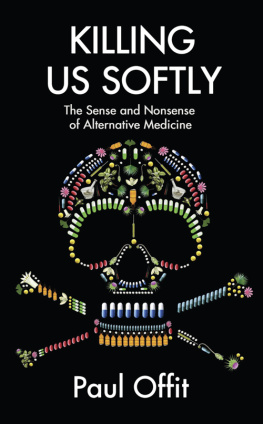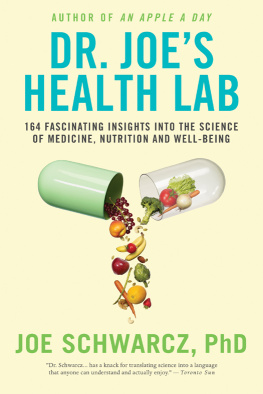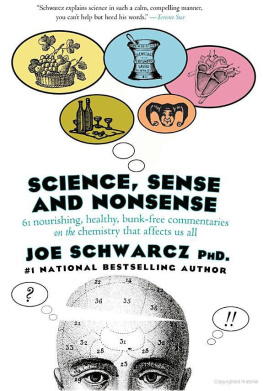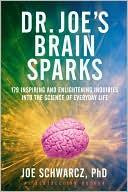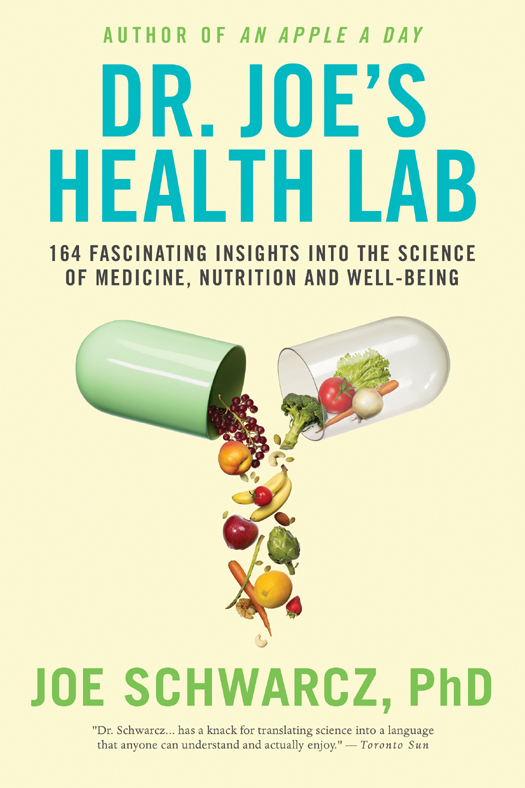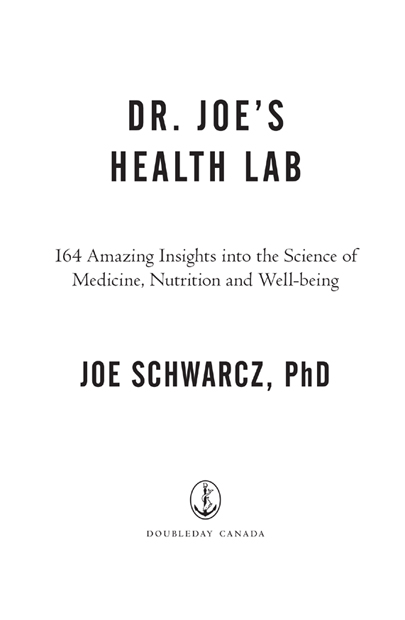Copyright 2011 Dr. Joe Schwarcz
All rights reserved. The use of any part of this publication, reproduced, transmitted in any form or by any means electronic, mechanical, photocopying, recording or otherwise, or stored in a retrieval system without the prior written consent of the publisheror in the case of photocopying or other reprographic copying, license from the Canadian Copyright Licensing Agencyis an infringement of the copyright law.
1. NutritionPopular works. 2. Medicine, PopularMiscellanea. 3.
HealthPopular works. 4. FoodMiscellanea.
I. Title.
INTRODUCTION
I ll be honest with you. Ive never been particularly thrilled by lab work. That must sound strange, coming from someone who worships at the altar of science, but its true. It isnt that I didnt enjoy carrying out research. Discovering something new, whether it has any practical relevance or not, can be very satisfying. But for me, it wasnt satisfying enough. Thats because research by its nature tends to be narrowly focused, and I always had a broader interest in science. I realized that if I dedicated myself to laboratory research I would have to concentrate on one area, and I was much too fascinated by the amazing breadth of science to do that. Mine would be a laboratory of the mind, stocked not with flasks, beakers and chemicals, but with the knowledge gained from plowing through work carried out by others. My strength, I thought, lay in interpreting the complexities of scientific research, and in passing the knowledge I gained on to students and the public.
Im not sure how successful I have been in my endeavours, but I certainly have enjoyed presenting the nuances of science in the classroom, in public lectures, as well as on the radio, television and in my writings. The task is somewhat daunting because it requires keeping up to date with the scientific literature, which these days is virtually unmanageably voluminous. But one does what one can, and I continue to get a kick out of learning new things and passing the knowledge on to others. In the process, Ive managed to gather a fair bit of knowledge about nutrition, medications, cosmetics, toxins and household products. But the more you know, the more you realize how much more there is that you dont know.
The word science derives from the Latin word for knowledge. Science begins with the gathering of knowledge through observation and experimentation. The knowledge gained is then organized into testable laws and theories that can be validated through reproducible experiments. To be considered a science, a body of knowledge must stand up to repeated testing by independent observers. That, though, is easier said than done.
We can certainly claim that putting the fizz into a soft drink, neutralizing skunk smell on a dog, producing synthetic vanilla, launching a satellite into orbit, or dissolving rust stains in the toilet bowl are all scientific processes. We understand the exact details of the chemistry or physics involved, and anyone with the required expertise can readily repeat the procedures. In other words, when it comes to answering questions about these matters, we can say with confidence that we know. But when it comes to matters of healthtoxicological issues, in particularknowledge becomes much more elusive.
This shouldnt come as any great surprise, since dealing with the chemical goings-on in the human body is a far more complex business than dealing with rust in a toilet bowl. Furthermore, there are significant differences between people and the rodents that are used in most toxicological studies. Also, matters of health are clearly more important than matters of rust removal. There is far more at stake. More at stake for researchers forging careers, more at stake for marketers of health products, more at stake for industries accused of producing products with potential toxicity, more at stake for activists trying to raise funds, and of course more at stake for the consumer. It goes without saying that a lot of dollars are at stake as well. Research grants, medical expenses, company profits and even jobs hang in the balance, depending on what is determined to be known.
But the problem is that what is known when it comes to health matters is debatable. Determining whether trace amounts of chemicals in the environment pose a risk to health is not like determining how many calories there are in a gram of sugar. And when there are various vested interests involved, there is always the motivation to twist data in the direction of a desired outcome. It is not uncommon for academic or industrial researchers to be accused of such data manipulation, but somehow environmental groups, at least in the public eye, are often judged to be above such antics. The truth is that all stakeholders strive to present their viewpoint in the most convincing fashion. Allegations about research tainted by vested interests are often met with accusations of irrational fearmongering, leaving the public bewildered.
Adding to the confusion is the incredible blast of information directed at us constantly by the media. Virtually every day seems to bring breakthrough research that either warns us about a chemical that may hasten our demise, or comforts us with the prospect of some miraculous drug or dietary supplement that will allow us to live longer and healthier lives.
And then there is the Internet. Clearly, a wonderful source of reliable information if one knows where to look, but websites promoting nonsensical views or products are often more seductive than those based on rational science. Charlatans and assorted kooks trap the unwary in a web of deceit. Understandably, people want to know whats what, who is to be trusted. What they dont understand is how hard it is to really know, especially when it comes to questions about the likes of endocrine disruptors, genetically modified foods, herbal remedies, electromagnetic fields, dental fillings or pesticide residues.
On the other hand, there is much that we do know. Interesting stuff. We know about probiotics, beta-blockers, the effects of bicycle seats on erectile dysfunction and how to make trans fatfree margarine. We know what happens when you ingest meow-meow, why Asians are more likely to flush red after drinking alcohol and why oolichan may have some health benefits. We also know what glucosamine can and cannot do, why an apple a day may keep the oncologist away, why you may want to consume beta-glucan, why Hippocrates thought that watercress was particularly healthy and why you may want to steer away from an Electro-Physio-Feedback-Xrroid device or a Danish water revitalizer. We even know about toilet bowl cleanerand why you should never mix it with bleach. If you want to know too, just turn the page and step into my lab. No lab coat or safety glasses required.


